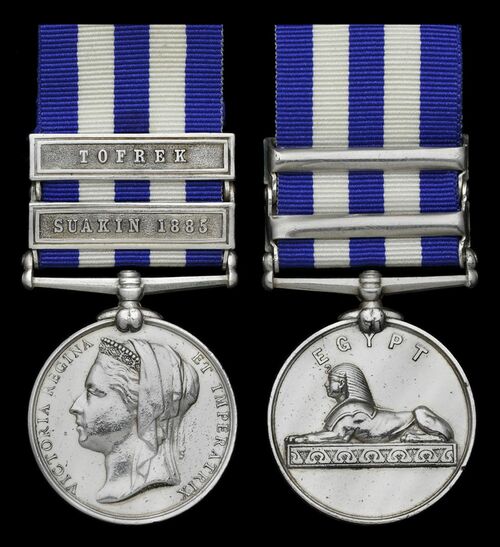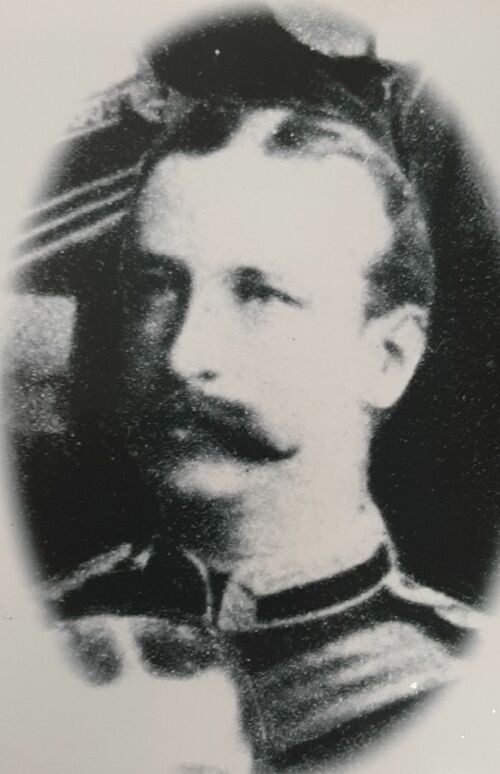Auction: 24001 - Orders, Decorations and Medals
Lot: 228
A remarkable Egypt and Sudan medal awarded to Colonel J. Smyth, Indian Medical Department attached Madras Sappers and Miners; wounded at the Siege of Tamaai, he was later an Honorary Physician to King George V during the Great War
Egypt and Sudan 1882-89, undated reverse, 2 clasps, Suakin 1885, Tofrek (Surgn J. Smyth. M.D. Ind: Med: Dept.), pitting, light edge bruising, very fine overall
John Smyth was born on 27 September 1857 and educated first at Queen's College Belfast before attending the Royal University of Ireland in 1879 (M.D. M.Ch 1st Class Honours). Qualifying as a Surgeon he joined the Indian Medical Department on 1 October 1881.
Sudan
Serving attached to 'F' Company, Madras Sappers and Miners he disembarked at Suakin on 12 March 1885 for service with General Graham's Army. They were part of the British force which drove the Dervishes from a strongpoint at Hashin and fortified the area afterwards before being ordered to join General McNeill's column to secure a supply post at Tofrek.
They were engaged in constructed a zariba when a cavalry patrol rode in warning that a large Dervish force was on their heels. The Mahdists struck the camp moments later, stampeding the baggage animals and breaking a battalion of Sikh infantry. In the ensuing rush a number of Dervish warriors made it into the defences, particularly the south-west redoubt where they killed the Naval gun crew. Fortunately, a half battalion of the Berkshire Regiment rallied and drove them off again.
'F' Company had been unloading supplies from the pack animals when the attack began and were carried away in the rush that followed, suffering heavy losses of 13 killed and 21 wounded. The medical staff, including Smyth improvised field hospitals after the battle and treated the wounded.
He was still with the Regiment two weeks later when they marched as part of a much larger column on Osman Digna's headquarters at Tamaai. They burned it to the ground between 2-3 April in what was called the 'Siege of Tamaai', the force had few casualties although three men of the New South Wales Contingent were noted as wound. Smyth was also wounded however the resistance was limited and it would not be long before the British Government again withdrew their forces from the region.
India and the Great War
Smyth remained with the Indian Medical Department and qualified in Tamil in July 1893 and was advanced Lieutenant-Colonel on 1 October 1901. He authored a paper entitled 'Notes on Applied Sanitation in Japan' in 1909 and the next year was posted to the Supernumerary List, being advanced Colonel on 7 June 1911.
Still in service when the Great War broke out Smyth was not called up for service, instead he was granted the honour of being Honorary Physician to the King on 12 February 1916. The strain of the war upon the King was very great and it was noted that his health had declined throughout it. He held the post for two years, finally retiring on 31 October 1918.
Smyth died at Clifton on 2 July 1927; sold together with copied research comprising application for appointment, Army Lists, Will and extracts from the Roll of the Indian Medical Service.
Subject to 20% VAT on Buyer’s Premium. For more information please view Terms and Conditions for Buyers.
Sold for
£450
Starting price
£350







